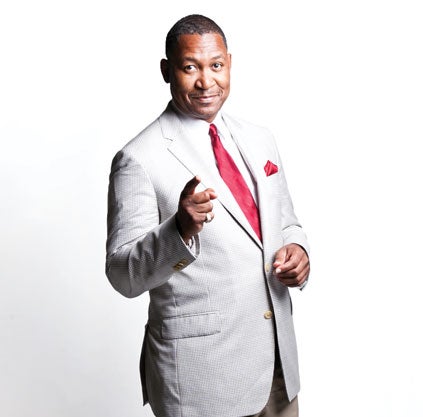 Since coming to the College in 2014 to lead the School of Languages, Cultures, and World Affairs, Dean Antonio D. Tillis has been an impassioned advocate for greater cultural awareness and the importance of international experiences. We caught up with the globetrotting dean to find out more about his literary influences, his taste in music and his love of salsa (the dance, not the sauce).
Since coming to the College in 2014 to lead the School of Languages, Cultures, and World Affairs, Dean Antonio D. Tillis has been an impassioned advocate for greater cultural awareness and the importance of international experiences. We caught up with the globetrotting dean to find out more about his literary influences, his taste in music and his love of salsa (the dance, not the sauce).
AS A KID GROWING UP IN MEMPHIS, YOU WERE SURROUNDED BY THE BLUES. WHAT KIND OF MUSIC DO YOU ENJOY? My music taste is quite eclectic, ranging from blues, jazz, gospel, hymns and spirituals to classical compositions (vocal and instrumental).
WHAT WAS THE FIRST ALBUM YOU PURCHASED? I believe that it was Prince’s self-titled album, 1979, unbeknownst to my folks. Prince was gaining national attention among my peers and I loved his acoustic-electric guitar sound. Actually, sneaking to his concert years later, in 1982, resulted in one of my longest punishments.
HOW DID YOU BECOME INTERESTED IN SPANISH LITERATURE? My earliest recollection is when I was probably 5 years old. My aunt Sheila was taking Spanish in high school. She taught me how to count to 10 in Spanish; a lesson that I never forgot. In the academic optional program at Memphis Central High, we had to choose areas of concentration; and, as you can probably guess, one of my areas was Spanish. I just loved the sound of the language and thought it neat to speak another language.
WHAT BOOK HAS HAD THE MOST INFLUENCE ON YOU? Wow! That’s a tough one for a literary scholar. However, I must say that it’s a toss-up between Miguel de Unamuno’s Niebla and Piri Thomas’ Down These Mean Streets.
Unamuno’s work was the first philosophically creative work that challenged me to think about notions of being (ontology), knowing (epistemology) and existing (existentialism). I was totally consumed by this novel as protagonist Don Augusto (presumably Unamuno) grappled with ideas of creation, humanity, eternity and the like.
Additionally, I was fascinated by the life of Piri Thomas when I first read his memoir. The idea of someone expressing or trying to understand/celebrate a bi-ethnic identity in the U.S. during his coming-of-age era was quite novel. Specifically, partly due to my burgeoning love of Spanish and Latino culture, I was intrigued by Piri Thomas’ struggle to assert an identity that celebrated being both black and Spanish-Caribbean. It challenged critically my understanding of the “one-drop rule” and the Duboisian concept of the Negro “double- consciousness” in American society.
YOU HAVE WRITTEN EXTENSIVELY ON POET BLAS JIMÉNEZ. HOW DID YOU CONNECT WITH HIS POETRY? I actually met the poet before discovering his work. Blas was an invited guest to the Afro-Romance Institute at the University of Missouri- Columbia, where I did my doctoral work. His talk on blackness in the Dominican Republic was quite provocative. The following semester, I enrolled in my first Afro-Hispanic literature class, where his first collection was on the required reading list. Thus, the affair with his poetry began.
WHAT’S ON YOUR NIGHTSTAND RIGHT NOW? Junot Diaz’ This Is How You Lose Her.
HOW MANY COUNTRIES HAVE YOU VISITED? Man, let’s see … probably some 40 plus.
WHEN YOU TRAVEL, DO YOU COLLECT ANYTHING? Most definitely. When I can afford it, I buy local art. In addition, I buy native spices, especially hot sauces, and coffee.
WHAT’S YOUR FAVORITE SPANISH WORD? I would say salsa, a word that needs no translation. Being passionate about music and dance, when I hear the word, it makes me want to move. I love the hissing sound of the s in the first syllable.
IF YOU COULD TAKE ANY CLASS AT THE COLLEGE TODAY, WHAT WOULD IT BE? Arabic and Chinese.
WHAT OBJECT IN YOUR OFFICE DO YOU CHERISH MOST? A small, tattered photo of Frederick Douglass.
WHAT ONE BIT OF ADVICE WOULD YOU GIVE AN INCOMING FRESHMAN STUDENT? Dare to explore the endless possibilities that the new journey brings.
WHY IS AN EMPHASIS ON INTERNATIONAL EDUCATION IMPORTANT? Today’s generation of students is even more connected globally by means of technology, especially social media. It’s imperative that students in this generation understand their place and responsibility in the global world. There is virtually no profession that doesn’t have a global reach. It’s literally impossible to embrace fully the implications and understandings of such a statement without a focus on global education.
IF YOU COULD BE THE PRESIDENT OF THE UNIVERSITY FOR A DAY, WHAT WOULD YOU DO? I would make a significant international experience be a requirement for graduation, which is not necessarily limited to study abroad.
HOW DO YOU BLOW OFF STEAM? By meditating, walking through my neighborhood, cooking and grooving to jazz vocalist Gregory Porter.
WHAT IS YOUR VICE? As I watch and feel the inner tube surrounding my waist inflate, I’ll have to say eating deliciously fattening Southern food. It just makes me happy!
WHAT HAVE YOU ENJOYED MOST ABOUT CHARLESTON SINCE YOU MOVED HERE? ¡Sin duda la comida! (definitely the food!).




